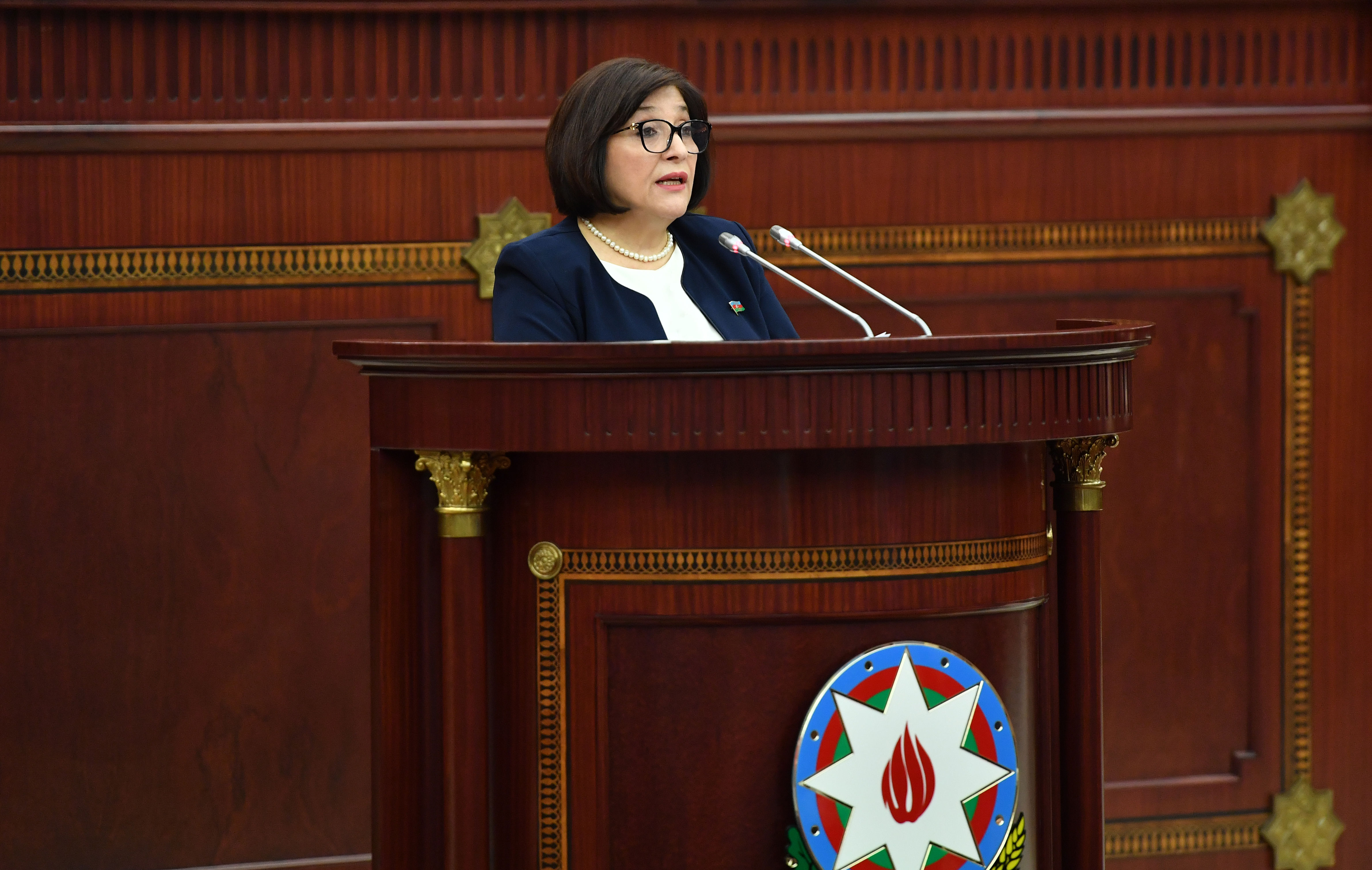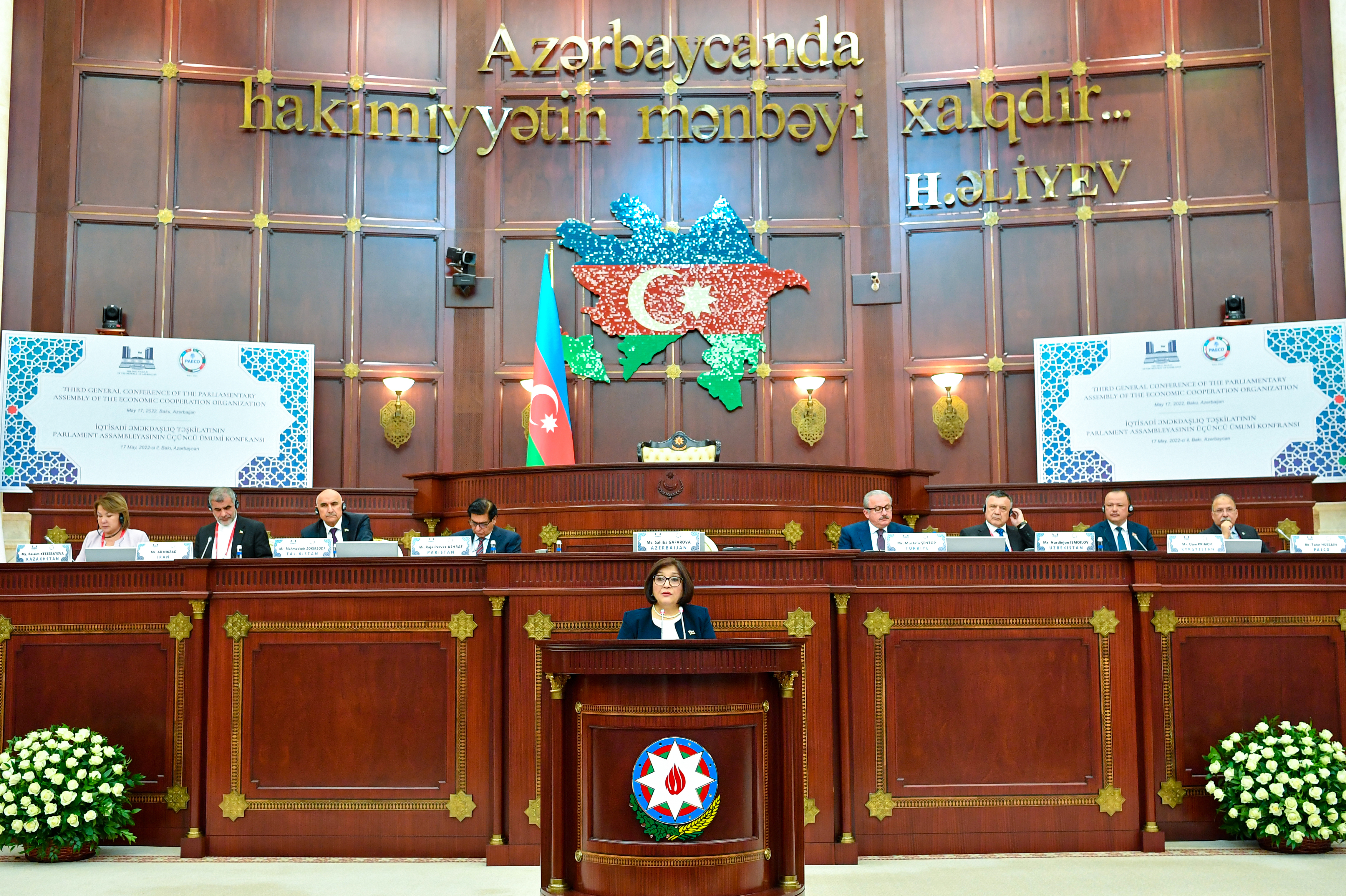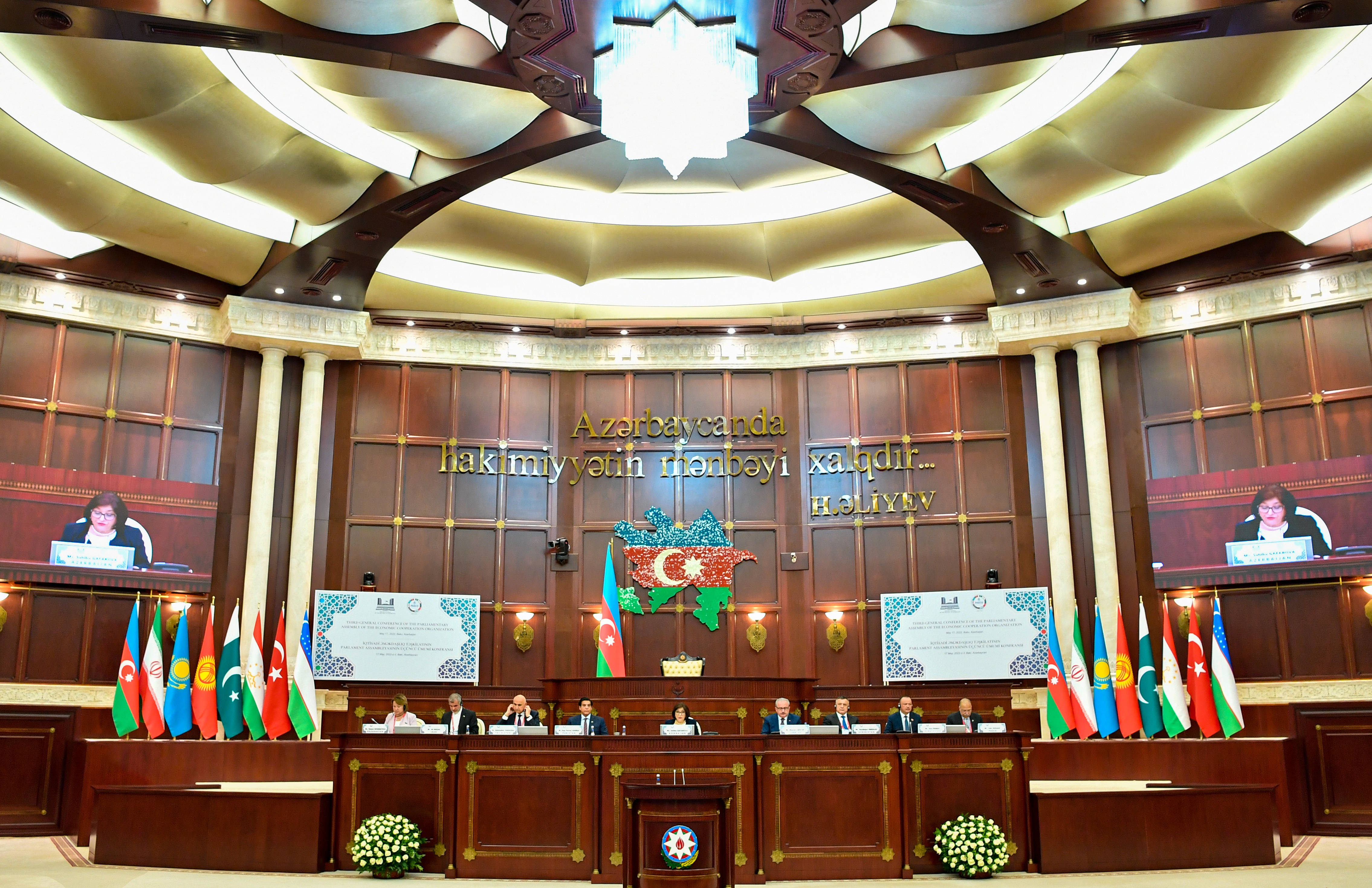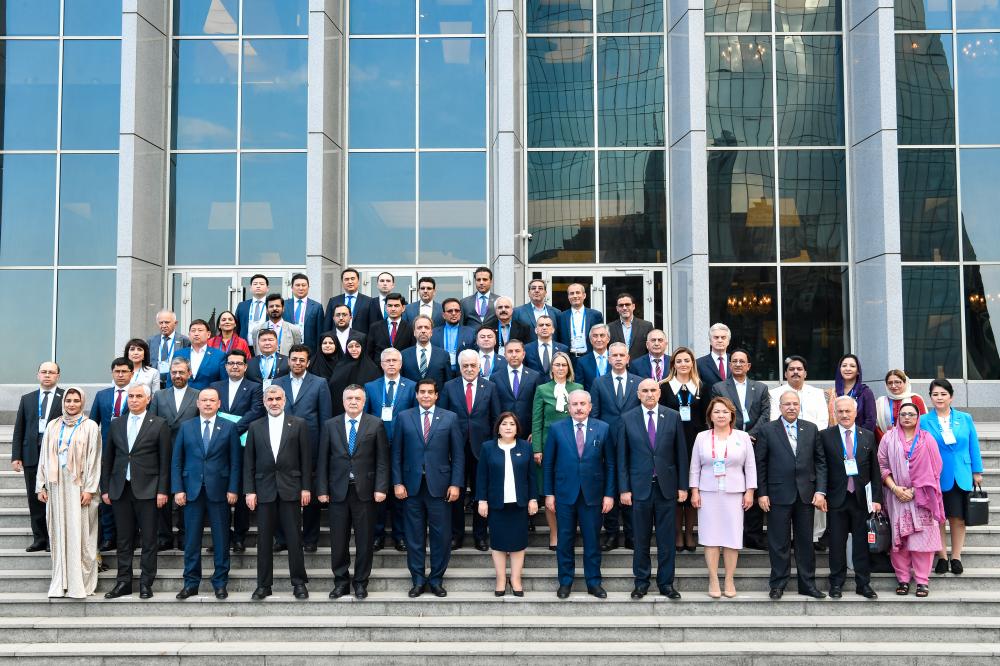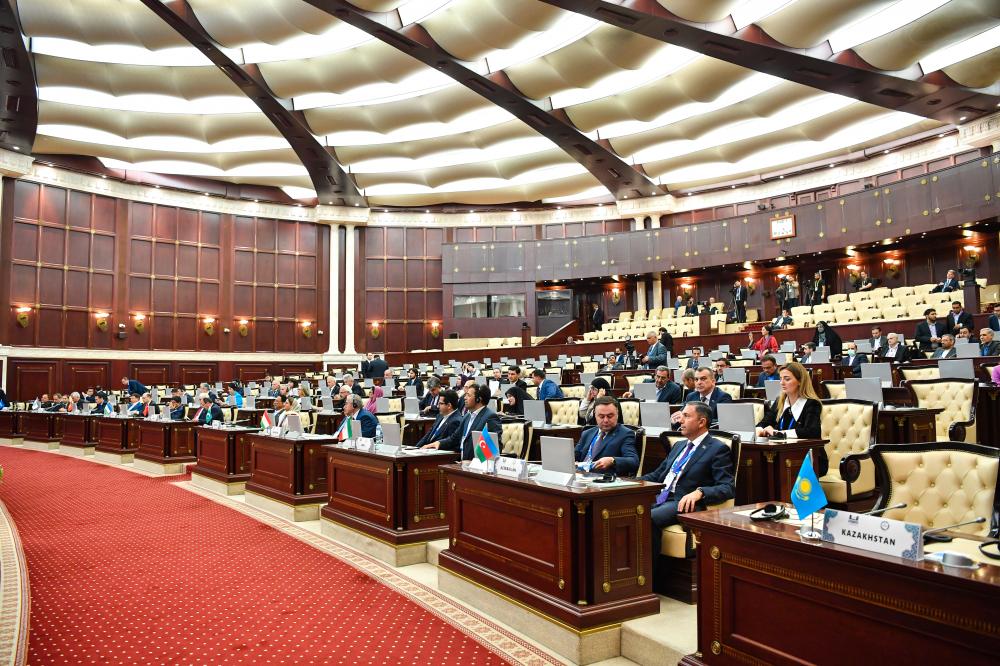Third General Conference of PAECO Takes Place in Baku
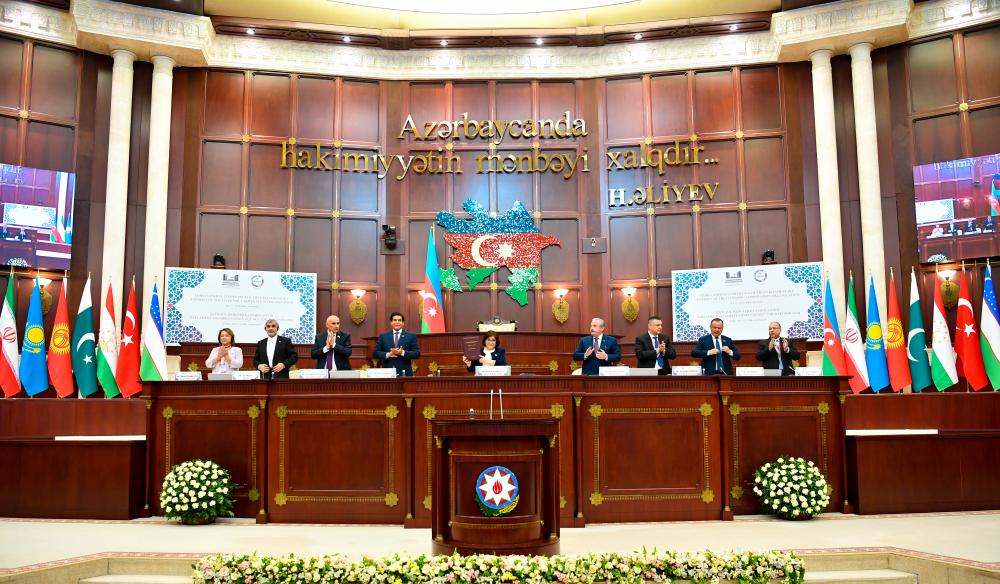
The Third General Conference of the Parliamentary Assembly of the Economic Co-operation Organisation entitled Post-Pandemic Co-operation: Challenges and Restoration Opportunities took place at the Milli Majlis on 17 May.
The Chair of the Azerbaijani Parliament Sahiba Gafarova opened the conference by welcoming all the participating delegations on behalf of the Milli Majlis. She also thanked the National Assembly of the Islamic Republic of Pakistan for the successful chairmanship of the PAECO and filling the role of the PAECO Secretariat. Besides, Mrs Gafarova mentioned the substantial work that the Pakistani side had carried out to strengthen the institutional basics of the PA, and praised the part played by the Secretariat in the conduct of the Third General Conference. There is so much to do to tap the full potential of this organisation; the Milli Majlis of Azerbaijan stands prepared to begin to work in the spirit of steady partnership. Three PAECO committees had had their meetings to date, Mrs Gafarova remarked, adding that the conference was now to proceed in accordance with its agenda. Having said that, she gave the floor to the PAECO Secretary General Tahir Huseyn so he would inform the conference participants of the decisions made by the Executive Council of the entity.
Mr Huseyn told the assembly that the Baku Declaration had been approved for all the attending delegations to sign and the PAECO Second General Conference report had been tabled at the Executive Council meeting. Besides, the Executive Council had seconded the motion by the PAECO working group drawn from the Azerbaijani, Turkish and Pakistani parliamentary delegations and that, therefore, the administrative and financial regulations of the PAECO Secretariat would be adopted duly. At the same time, the Executive Council had approved changes in the procedural rules of the PAECO. And the Milli Majlis had hosted the already-mentioned meetings of three committees of the Assembly, Mr Huseyn reported.
Sahiba Gafarova’s speech at the Third General Conference contained a mention of the transfer of the PAECO chairmanship from the National Assembly of the Islamic Republic of Pakistan to the Milli Majlis of the Azerbaijan Republic; the takeover had taken place during the conference. Sahiba Gafarova assured the participants that, in its chairmanship term, the Parliament of Azerbaijan would be making every effort to make the Assembly stronger and to cement the co-operation amongst the legislatures of our countries.
The Azerbaijan Republic thinks the ECO an important regional organisation and is keen to promote bilateral as well as multilateral interaction with the other member-states.
Our nations are bonded with their common history, culture, traditions and creed. In this sense, the parliamentarians as the envoys of their respective nations have a special kind of responsibility and, whilst supporting the achievement of its goals and tasks, the PAECO is also fostering the strengthening of the ties amongst the national legislative assemblies and bringing our peoples yet closer together, Sahiba Gafarova was saying.
The Milli Majlis of the Azerbaijan Republic finds its work done under the auspices of the PAECO to be of peculiar importance as can be seen from the ratification of the Charter of the Assembly, according to Mrs Gafarova who urged the other participating parliaments to sign and ratify that Charter because this move on their part would ensure a continued expansion of their contacts amongst them.
The subject of the Third General Conference is of utmost importance considering the deplorable damage that the COVID-19 pandemic has dealt to economy, health care and all the aspects of social life the world over and considering also the serious complications posed by such damage. Regrettably, the global community had proven ill-prepared for such hardships and it had taken time to find ways out of the crisis therefore. The interrelation of the problems caused by the pandemic and, first of all, the gravity of the socio-economic burden made it necessary to unite the anti-pandemic and post-pandemic clean-up steps taken around the world.
The Azerbaijan Republic had put forth a series of fortunate global initiatives to that end. As suggested by the esteemed President Ilham Aliyev of Azerbaijan acting in the capacity of Chairman of the Non-Aligned Movement, a special session of the UN General Assembly to discuss the countering of the COVID-19 pandemic had been called in December 2020. In March and December 2021, the UN Human Rights Council and the UN General Assembly passed resolutions about ensuring equal, timely, universal and affordable access to vaccines for all countries in the course of the struggle against the COVID-19 pandemic. As well as that, Azerbaijan was sending financial and humanitarian aid to the countries the pandemic had hit the hardest, and had been donating vaccines to them.
Even though the pandemic is not done with completely yet, its harshest period has gone and so we should all prepare for what next steps are to be taken; we should all pay yet closer attention to post-pandemic recovery issues so that we are better able to withstand possible future challenges. President Ilham Aliyev of Azerbaijan has brought forward an initiative of a high-level global post-COVID-19 recovery panel under the aegis of the UN already. Such a panel could generate specific recommendations concerning global moves that should be made in the wake of the pandemic.
Sahiba Gafarova went on with her speech to say that the regional co-operation formats formed by the organisations such as the ECO were hugely helpful in terms of uniting forces and promoting solidarity with regards to the post-pandemic recovery agenda. Members of the national parliaments ought to support the endeavours of their respective countries to arrange and foster multilateral co-operation specifically in the modern age in which parliamentary diplomacy had gained such a thrust. Exchange of opinions and experience through the already-established dialogues, new ideas and the potential of parliamentary committees’ collaboration are all very useful when it comes to striving for that goal.
The post-pandemic period requires that economic and trading links meeting the interests of our countries should be restored and elevated back to their previous levels. To do that, it is crucial to diversify transport communications and transit routes as this is needed for the whole transport potential of our region to materialise. Azerbaijan is offering its own resources to that end. Our country has built the latest-standard transport infrastructure. Sitting on the East-West and North-South transport corridors, Azerbaijan is one of the key transport and logistical hubs in Eurasia today.
According to the Chair of the Milli Majlis, it is one of the mandatory aspects of post-pandemic recovery to promote and maintain lasting peace and stability in our region. As she talked about the current processes designed to reach that aim, Mrs Gafarova mentioned Azerbaijan having liberated its lands from the Armenian occupation that had lasted for close to three decades in 2020. The Patriotic War of 44 days had culminated in the historic triumph of our country, which had made her national territory intact again and had also enforced, all by herself, the certain resolutions of the UN Security Council passed in 1993 and demanding immediately, complete and unconditional withdrawal of the armed forces of Armenia from the Azerbaijani territories they had occupied.
Armenia had razed our towns and villages, vandalised our cultural heritage, monuments of history and of religion, and profaned our mosques and shrines during the period of occupation.
Restoration of our formerly-captured lands started on a large scale immediately they were liberated; this work is continued at the expense of Azerbaijan only.
The infrastructure devastated in the years of occupation is being built from scratch. New towns and villages are under construction in Garabagh and East Zangazur which had been declared ‘green energy’ zones. The former IDP are due to return to their native parts as soon as starting this year.
The biggest setback to that work is posed by the mines with which the Armenian side had stuffed our lands before they could be delivered from the invaders’ claws. More than 210 civilians and military servicemen had either died or been mauled in mine explosions since 10 November 2020. A propos, despite being one of the most mine-contaminated countries of the world, Azerbaijan is also rather lamentably amongst the states in receipt of the least international assistance with solving the mine problem, Sahiba Gafarova remarked.
A year and a half had passed since the ending of the 44 days’ Patriotic War. Azerbaijan has invited Armenia to sign a peace treaty to result in mutual sovereignty and territorial integrity recognition, initiate delimitation and demarcation of the borders, restore all the regional communications and normalise the relations. We wish to talk about peace and future rather than about war, Sahiba Gafarova stressed.
It was then emphasised that Azerbaijan continued the efforts to install lasting peace and stability in the region and that another trilateral meeting had taken place in Brussels on 6 April at the suggestion and with the participation of the President of the EU Council Charles Michel. On the eve of that meeting and, remarkably, also after it Armenia declared its acceptance of the five principles proposed by Azerbaijan to underlie the future peace treaty. Still, there is no practical step to that end on Armenia’s part in sight as yet, and this is so despite the fact that the make-ups of the Azerbaijani delegation to sign the peace treaty and of the Azerbaijani national commission for deliberation and demarcation of the borders between the two states are finalised already. In a word, Azerbaijan is standing by to begin peace talks.
Armenia should get a clear picture of the obligations it has undertaken, and Armenia should also show a constructive approach to this problematic as well as start moving towards normalisation of the relations on the basis of the aforementioned principles. This is the only path that leads to peace and stability in our region.
Sahiba Gafarova mentioned the new realia and co-operation opportunities present in the post-war South Caucasus towards the end of her speech. The new transport infrastructure to be put in operation in line with the existing arrangements – the Zangazur Corridor, that is to say – will become an important component of the already-functioning corridors East-West and North-South. All the ECO member-states will be able to benefit by the use of this new corridor, too.
The speech of the Chair of the Milli Majlis was followed by those of the leaders of the delegations taking part in the PAECO Third General Conference.
Chairman of the National Assembly of the Islamic Republic of Pakistan Raja Pervaiz Ashraf underlined the community of the values held by the nations of all the PAECO member-states. He also spoke about the importance of peace and prosperity in the region for economic and co-operation progress, and stressed the need to combine efforts to address the existing problems.
Chairman of the Assembly of Representatives of the Majlisi Oli of the Republic of Tajikistan Mahmadtoir Zokirzoda said that today’s conference was going to make the inter-parliamentary connexions stronger still. He mentioned the complications that the COVID-19 pandemic had caused around the world and told the colleagues what his country had been doing to eliminate the aftermath of the pandemic. The guest also brought up the importance of the collaboration under the aegis of the ECO for economic progress of the countries of the region.
Chairman of the Grand National Assembly of Turkey Mustafa Şentop began his speech by witnessing his pleasure at attending the PAECO Third General Conference and thanking Chair of the Milli Majlis of Azerbaijan Sahiba Gafarova for the high level of the event’s arrangement and for hosting it in Baku. In the opinion of Mr Şentop, this conference is essential for the progress of the member-states and the region as a whole as much as it is for the well-being of the nations that populate the region. The continuity of economic and social development requires that mutual integration and co-operation continue; Turkey, then, is always ready to make efforts to that end. Besides, Turkey attaches immense significance to making inter-parliamentary connexions stronger, Mr Şentop said, adding that he trusted that parliamentary diplomacy was going to make a contribution of its own to regional integration and development.
The coronavirus pandemic had caused rather profound social, economic and humanitarian problems globally – the problems solving which is dependent on joint efforts as a prerequisite, according to Mustafa Şentop.
International solidarity had become a priority matter; at the same time, the current processes had once again highlit the topicality of parliamentary diplomacy, Mr Şentop continued. It is tremendously important that there is legislative support to decisions made in regard to countering the pandemic and, amongst all else, respective social matters and applying financial resources efficiently, in the opinion of the leader of the Turkish Parliament.
The head of the GNAT also broached the subject of Azerbaijan’s having liberated its own lands from the occupation by Armenia, saying that the work of the Minsk Group on settling the conflict had proven completely barren of result. Mustafa Şentop emphasised the constant Turkish backing to the just stance of Azerbaijan and congratulated, once again, the president of Azerbaijan Ilham Aliyev on the victory in the 44 days’ Patriotic War.
‘Garabagh is Azerbaijan,’ Mr Şentop added in conclusion.
Chairman of the Legislative Chamber of the Oliy Majlis of the Republic of Uzbekistan Nurdinjon Ismoilov, Deputy Chairman of the Islamic Consultative Assembly of the Islamic Republic of Iran Ali Nikzad, Deputy Chair of the Mazhilis of the Parliament of the Republic of Kazakhstan Balaim Kesebaeva and Deputy Chairman of the Joğorqu Keñeş of the Kyrgyz Republic Ulan Primov addressed the PAECO states’ agenda of promoting regional co-operation after the pandemic ends. They underscored the significance of the PAECO as a driver behind regional socio-economic progress as well as they did the necessity of broadening the economic, trading, transport and logistical collaboration that is advantageous to all the parties concerned. The leaders of the national legislative bodies also touched on the tasks befalling their assemblies with respect to solving the current problems, and mentioned the input that the events like today’s conference brought to the on-going strengthening of bilateral and multilateral inter-parliamentary connexions.
All the delegation leaders speaking at the conference in Baku pointed at its high organisational standards and said they were certain that it would promote a continued progress of mutually beneficial co-operation in all the areas between all the states of the region – including the parliamentary collaboration.
The ECO Secretary General Khusrav Noziri thanked the Government of Azerbaijan and the Chair of the Milli Majlis Sahiba Gafarova for the arrangements made for the attending delegations before touching on the growing roles of parliaments in global developments, praising the very establishment of the ECO Parliamentary Assembly and bringing the focus on the efforts that all the member-states had made to make this forum more robust. Mr Noziri also shared his ideas about the future activity vectors of the Organisation.
The PAECO Secretary General Tahir Huseyn announced the signing of the Baku Declaration as the next item on the agenda of the conference. The leaders of the delegations signed that document then.
Chair of the Milli Majlis Sahiba Gafarova announced after the signing ceremony that the PAECO Third General Conference had come to an end.
Azerbaijan had taken over the chairmanship of the Assembly and would be doing all within her powers to fulfil her relevant obligations to make the Assembly stronger. Mrs Gafarova expressed a conviction that the ideas that had been heard at the conference today were bound to enrich the common work and make it possible for our co-operation to conquer new summits. The Milli Majlis is ready for broader collaboration with all the other national legislatures, Mrs Gafarova added.
Sahiba Gafarova thanked all the members of all the delegations for their participation.
Next, a family photograph of the delegations’ members was taken.
The Press and Public Relations Department
The Milli Majlis



